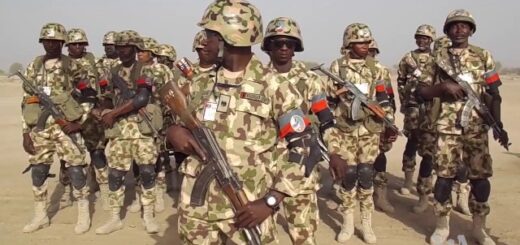Nigerian Army Ranks, Symbols & Salaries (2026)
The Nigerian Army is the largest military branch of the Nigerian Armed Forces. It is responsible for the defense of Nigeria’s territorial integrity and for assisting the civilian government in maintaining law and order. The Nigerian Army has a long and proud history, dating back to the formation of the Royal Niger Company Constabulary in 1897.
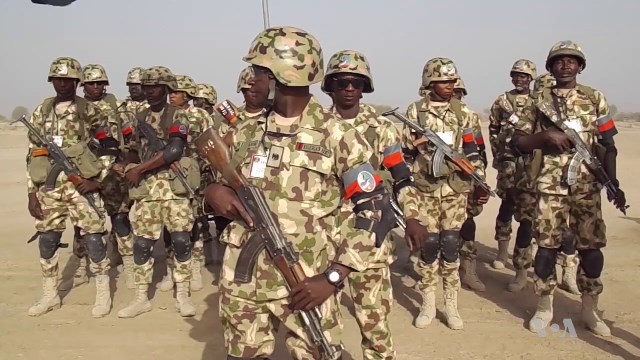
The Nigerian Army is also one of the strongest defense forces in Africa and has played a key role in many of Nigeria’s most important events, including the Nigerian Civil War (1967-1970) and the restoration of democracy in 1999. Today, the Nigerian Army is a modern and professional force that is committed to protecting Nigeria’s security and interests.
Ranks and symbols are important for the Nigerian Army because they help to identify and distinguish between different levels of authority and responsibility. They also help to instill a sense of pride and esprit de corps among soldiers.
THE STRUCTURE OF THE NIGERIAN MILITARY
The Nigerian Military or The Nigerian Armed Forces (NAF) is the backbone of the country’s defense, safeguarding its citizens from both domestic and foreign threats while preserving the nation’s territorial integrity. The NAF comprises three distinct service branches, each with a unique role in ensuring Nigeria’s security:
- Nigerian Army: The bedrock of the NAF, the Nigerian Army is tasked with maintaining peace on land, upholding law and order, and spearheading humanitarian missions. With its robust ground forces, the Army stands as a formidable guardian of Nigeria’s borders and internal stability.
- Nigerian Navy: Vigilant protectors of the nation’s maritime domain, the Nigerian Navy patrols the vast expanse of Nigeria’s coastal waters, ensuring the country’s security and sovereignty at sea. From safeguarding maritime trade routes to responding to emergencies at sea, the Navy plays a crucial role in safeguarding Nigeria’s maritime interests.
- Nigerian Air Force: Soaring above the battlefield, the Nigerian Air Force provides air supremacy, cargo transportation, and critical air support to ground forces. With its fleet of fighter jets, transport aircraft, and helicopters, the Air Force dominates the skies, ensuring Nigeria’s aerial defense and tactical superiority.
Together, these three service branches form a cohesive and formidable defense force, safeguarding Nigeria’s sovereignty, protecting its citizens, and contributing to regional and global security. The Nigerian Armed Forces stands as a testament to the nation’s commitment to peace, security, and stability.
HISTORY OF THE NIGERIAN ARMY
The Nigerian Army, established in 1960, is responsible for land warfare and is controlled by the Nigerian Army Council. Its history dates back to the formation of the Royal West African Frontier Force in Nigeria in 1900. The army has undergone modernisation efforts since 2015, with a focus on arms procurement, training, and a new doctrine centred around information gathering, mobility, and firepower. The army currently consists of over 6,000 officers and 150,000 soldiers.
NIGERIAN ARMY RANKS AND INSIGNIA
The Nigerian Army ranks are organized into commissioned officers and non-commissioned officers. The Nigerian Army maintains a well-defined rank structure, where each position holds specific responsibilities, status, and insignia. By observing a soldier’s uniform, one can readily identify their rank, their role within the army, and even their approximate earnings. Let’s delve into the various Nigerian Army ranks below:
NIGERIAN ARMY RANKS FOR NON-COMMISSIONED OFFICERS
The Nigerian Army non-commissioned officer ranks play a vital role in the army’s organizational structure and chain of command. These ranks signify increasing levels of seniority, responsibility, and expertise within the non-commissioned officer cadre.
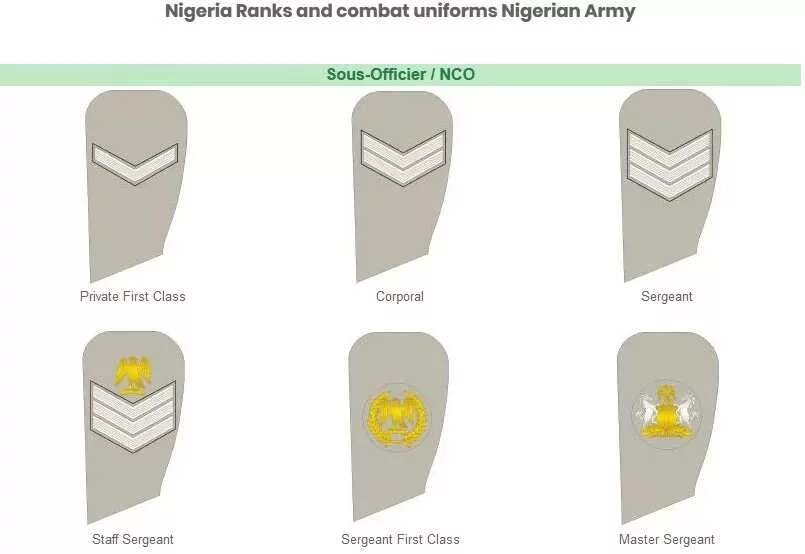
The Nigerian Army has a hierarchical structure with the following ranks for non-commissioned officers in ascending order:
- Recruit/Trainee – It is the lowest rank in the Nigerian Army. The rank is for recruits who do not have insignia. Visit the Nigerian Army recruitment portal for recruitment. A Trainee might get one shoulder mark.
- Private Soldier – This is the second rank after the trainee position.
- Lance Corporal – This is slightly higher than the recruit/trainee position but the second lowest officer rank. A Lance Corporal receives a one-shoulder mark.
- Corporal – It is the third lowest level of the Nigerian Army hierarchy. A Corporal has two shoulder marks and oversees a troop’s body.
- Sergeant – A Sergeant gets three shoulder marks and is a junior non-commissioned officer.
- Staff Sergeant- This is a senior non-commissioned rank of the Nigerian Army. A Staff Sergeant has three shoulder marks and a golden eagle on top.
- Warrant Officer/Sergeant First Class – Its insignia is the golden eagle surrounded by the matching golden crown made of olive leaves. A Warrant Officer is an assistant of the Master Sergeant.
- Master Warrant Officer/Master Sergeant – Nigerian army officers in this rank are in charge of military equipment. The insignia of the Master Warrant Officer/Master Sergeant is the Nigerian Coat Of Arms, where the horses are silver, and the rest is golden.
NIGERIAN ARMY RANKS FOR COMMISSIONED OFFICERS
The Nigerian Army has a hierarchical structure for its commissioned officers. These ranks denote the levels of authority and leadership within the officer cadre. Each rank signifies increased responsibility and the opportunity for professional growth. The commissioned officer ranks in the Nigerian Army include:
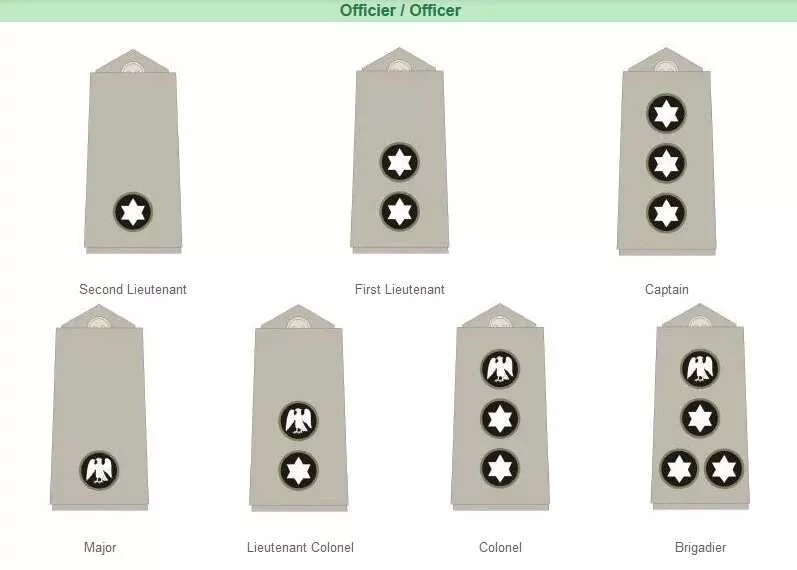
The Nigerian Army ranks for commissioned officers from the lowest to the highest include:
- Second Lieutenant: Each shoulder of a Lieutenant is adorned with a single silver star, or a six-pointed star. The definition of lieutenant is “substitute.”
- First Lieutenant: The officer’s shoulders are adorned with two silver stars arranged vertically. The deputy of the captain is a first lieutenant.
- Captain: Three silver stars arranged vertically are awarded to captains. Within the tactical troop organisation, this is the highest level.
- Major: Each shoulder of a major is adorned with a silver eagle. In the Nigerian Army, it is one of the lowest ranks for field officers.
- Lieutenant Colonel: The deputy to the colonel is a lieutenant colonel. The officer has a silver eagle and a silver star on each shoulder that are oriented vertically. Among field officers, this rank falls somewhere in the middle.
- Colonel: A vertically aligned silver eagle and two silver stars are affixed to each shoulder of a colonel. In the hierarchy of field officers, the officer is at the top, and in the hierarchy of commissioned officers, at the bottom. The Colonel is also in charge of the regiments.
- Brigadier Generals: These Officers are mostly in charge of brigades. On each shoulder, a brigadier general is adorned with three silver stars. A silver eagle perches above a triangle formed by the stars.
- Major General: A mid-level commissioned officer rank is a major general. The officer is adorned with a golden symbol on each shoulder, which is a crossed sword and baton beneath a golden eagle. The Nigerian Army’s third-highest rank is lieutenant general. Lieutenant Generals are identified by the gold shoulder-mounted symbol, which is a cross between a sword and baton, a star, and an eagle.
- The General: The officer is adorned on both shoulders with an eagle, two stars, and a crossed sword and baton arranged vertically. Within the Nigerian Army, it is the second-highest rank.
- Army Field Marshal/General of the Army: This is an unachievable rank, and no one has ever claimed it in the history of the Nigerian Army. An Army Field Marshal is required to wear a gold symbol on both shoulders, which consists of a crossed sword and baton encircled by two branches with an eagle perched on top.
These ranks represent a progressive career path for officers, with promotions based on experience, performance, and seniority. The highest rank of Field Marshal is a position of great honor and authority within the Nigerian Army.
Commissioned officers in the Nigerian Army hold key command, leadership, and strategic decision-making roles. They are responsible for overseeing military operations, ensuring discipline and morale, and upholding the values and traditions of the army. The commissioned officer ranks form the backbone of the Nigerian Army’s leadership structure.
As officers progress through the ranks, they acquire increasing levels of responsibility, gaining the necessary experience and expertise to effectively lead and manage the army’s operations. The commissioned officer ranks in the Nigerian Army reflect the commitment to professionalism, excellence, and service to the nation.
SYMBOLS OF NIGERIAN ARMY RANKS
The Nigerian Army utilizes various symbols and badges to represent the ranks of its officers. These insignia are worn on the uniforms of army personnel to indicate their rank and position within the military hierarchy. The symbols are designed to be visually distinctive and easily recognizable, allowing for clear identification of the individual’s rank.
Among the symbols used in the Nigerian Army are ropes in the shape of triangles, stars, eagles, crossed swords, and torches. Each symbol carries its own significance and is associated with a specific rank. For example, the use of a rope in the shape of a triangle may indicate the rank of a Second Lieutenant, while stars could represent a Brigadier General or higher.
These symbols play a crucial role in distinguishing the various ranks within the Nigerian Army, ensuring a clear and efficient chain of command. They also foster a sense of pride, professionalism, and discipline among army personnel. By wearing their respective symbols, officers not only demonstrate their rank but also contribute to the overall visual identity of the Nigerian Army.
THE NIGERIAN ARMY FLAG/LOGO: SYMBOLS & MEANING
The symbols on the Nigerian Army’s flag have it significance and meaning. The logo/flag features Arabic text on a red, black, and red background with an eagle perched on a shaded six-pointed star.
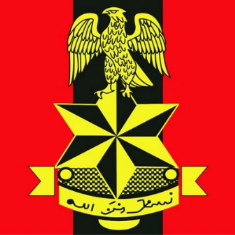
Nigerian army flag
These are what they signify:
- Eagle: The eagle represents the army’s grace and might. In times of peace, the army patrols the skies, like an eagle, and in times of war, it hits the enemy with deadly accuracy.
- Star: The star reflects Nigeria’s unity, which was established in 1914. A black star that has combined with a yellow star appears to be a shadow. The two stars represent the coming together of the Northern and Southern Protectorates to form Nigeria.
- Arabic writing: The Arabic writing is the Nigerian Army’s motto. It implies that victory comes from God alone.
- Red: The Red represents the enemy forces, and it is common practise in NATO to employ this colour in military elements.
- Black: The Black denotes cavalry and other soldiers.
IMPORTANCE OF NIGERIAN ARMY BADGES
- Facilitate rank identification
- Communicate hierarchy and chain of command
- Reinforce discipline and professionalism
- Foster a sense of pride and identity among personnel
DUTIES AND RESPONSIBILITIES OF NIGERIAN ARMY RANKS
Each rank in the Nigerian Army carries specific duties and responsibilities, contributing to the overall functioning and effectiveness of the military. The roles of commissioned officers and non-commissioned officers differ based on their levels of authority and responsibilities within the military hierarchy.
DUTIES OF COMMISSIONED OFFICERS
- Command and Leadership: Commissioned officers are responsible for commanding units and leading soldiers in operations and training exercises. They provide guidance, make strategic decisions, and enforce discipline within their units.
- Operational Planning: Commissioned officers develop operational plans, coordinating resources, and ensuring the successful execution of missions. They analyze intelligence, assess risks, and make critical decisions to achieve military objectives.
- Training and Development: Commissioned officers play a key role in training soldiers, ensuring they are prepared for combat and equipped with necessary skills and knowledge. They mentor and guide their subordinates to foster professional growth and maintain high standards of performance.
DUTIES OF NON-COMMISSIONED OFFICERS
- Training and Discipline: Non-commissioned officers are responsible for training and maintaining discipline among soldiers. They enforce standards, conduct drills, and provide guidance to ensure soldiers are physically fit, proficient in their duties, and adhere to military regulations.
- Operational Execution: Non-commissioned officers play a vital role in the execution of military operations. They lead small units, supervise soldiers, and ensure tasks are carried out efficiently and effectively.
- Mentoring and Support: Non-commissioned officers provide mentorship, guidance, and support to soldiers under their command. They assist in their personal and professional development, promoting teamwork, and fostering a positive work environment.
The clear division of duties and responsibilities between commissioned officers and non-commissioned officers enables the Nigerian Army to function effectively, maintain discipline, and achieve its objectives. This military hierarchy ensures a well-organized chain of command, allowing for efficient decision-making and the successful execution of operations.
HISTORICAL SIGNIFICANCE OF ARMY RANKS AND SYMBOLS
The ranks and symbols in the Nigerian Army hold great historical significance, representing the evolution of the army over time and its role in the nation’s history. They serve as a visual representation of the army’s rich heritage and traditions, instilling a sense of pride and identity among its personnel. These symbols and ranks serve as a reminder of the sacrifices made by past generations and the bravery displayed in defending the nation.
Throughout history, the Nigerian Army has played a vital role in various conflicts and peacekeeping missions. The ranks and symbols worn by army personnel not only reflect their individual achievements and seniority but also contribute to the overall discipline, structure, and professionalism within the army. They provide a clear visual hierarchy that helps maintain order and cohesion during operations.
The historical importance of the military hierarchy can be traced back to the early days of the Nigerian Army’s formation. As the army underwent modernization efforts, the ranks and symbols were modified to reflect changing times and strategic priorities. Today, they continue to hold significance as indicators of seniority, experience, and authority within the army.
Furthermore, these ranks and symbols also contribute to the overall national identity, as they represent the Nigerian Army’s role in upholding the country’s sovereignty and protecting its citizens. They serve as a source of inspiration and motivation for current and future generations, driving them to uphold the army’s legacy of honor, courage, and selfless service.
IMPORTANCE OF RANKS AND SYMBOLS IN MILITARY IDENTITY
The ranks and symbols in the Nigerian Army play a crucial role in forming the military identity of its personnel. They go beyond mere indicators of seniority and authority, serving as powerful symbols of pride, professionalism, and discipline. Each rank carries with it a set of responsibilities and expectations, shaping the behavior and mindset of soldiers and officers alike.
By wearing their rank symbols, army personnel visibly demonstrate their commitment to their duties and to the nation. These symbols act as a constant reminder of the significance of their role within the military hierarchy and the importance of upholding the values and traditions of the Nigerian Army. They foster a sense of belonging and unity, strengthening the camaraderie among soldiers and officers and creating a shared sense of purpose.
In addition to fostering military identity, these ranks and symbols also contribute to the overall cohesion and efficiency of the Nigerian Army. They provide a clear structure and chain of command, ensuring smooth communication and decision-making processes. The hierarchy established by the ranks allows for effective delegation of responsibilities, as each rank represents a specific level of expertise and experience. This enables the army to function as a well-oiled machine, with each soldier and officer knowing their place and role in the larger mission.
The importance of ranks and symbols in military identity cannot be overstated. They embody the values and ethos of the Nigerian Army, serving as a source of inspiration and motivation for its personnel. Through these symbols, soldiers and officers uphold their pride in serving their country, reinforcing their commitment to defending the nation’s interests and maintaining peace and stability. The ranks and symbols not only distinguish individuals within the army but also strengthen the collective identity of the entire organization.
ROLE OF RANKS AND SYMBOLS IN PROMOTIONS AND CAREER PROGRESSION
Ranks and symbols in the Nigerian Army play a crucial role in career progression and promotions. Advancement in rank signifies increased responsibility, authority, and opportunities for professional growth. The army follows a rank-based promotion system, where individuals move up the ladder based on their performance, experience, and qualifications.
Career progression in the Nigerian Army is a combination of time-based promotions and merit-based evaluations. As personnel fulfill their duties and gain experience, they become eligible for promotion to the next rank. This progression ensures that individuals are consistently challenged and given opportunities to develop their skills and leadership abilities.
The symbols worn by army personnel also serve as important indicators of seniority. These symbols, such as ropes in the shape of triangles, stars, and eagles, are visible cues that allow others to identify the rank and experience of an individual. They play a significant role in establishing a clear chain of command and maintaining order within the army.
Promotions and career progression in the Nigerian Army are highly valued and sought after. They not only provide individuals with increased responsibilities and authority but also come with additional benefits and recognition. Successful career progression is a testament to an individual’s dedication, professionalism, and commitment to serving their country.
WHO HOLDS THE HIGHEST MILITARY RANK IN NIGERIA?
The highest military rank in Nigeria is the Army Field Marshal/General of the Army. However, since the country gained independence in 1960, no one has achieved this prestigious level.
HOW CAN I DETERMINE MY RANK IN THE NIGERIAN ARMY?
By examining the logos and symbols they wear on their uniforms (the shoulders), you can differentiate Nigeria’s army ranks for non-commissioned and commissioned officers.
WHAT IS THE AVERAGE MONTHLY SALARY FOR A NIGERIAN ARMY OFFICER?
The Nigerian army offers varying pay rates for different ranks. On average, Nigerian military officers earn between N45,000 and N1.5 million. The salary increases as the soldier advances in rank.
See the table below for details of Nigerian Army Salary Structure
| COMMISSIONED OFFICERS | MONTHLY SALARY | NON-COMMISSIONED OFFICERS | MONTHLY SALARY |
| The General | N1,500,000 | Master Warrant Officer | N90,000 |
| Lieutenant General | N1,000,00 | Warrant Officer | N80,000 |
| Major General | N950,000 | Staff Sergeant | N68,000 |
| Brigadier General | N750,000 | Sergeant | N63,000 |
| Colonel | N550,000 | Corporal | N58,000 |
| Lieutenant Colonel | N350,000 | Lance Corporal | N54,000 – 55,000 |
| Major | N300,000 | Private Soldier | N48,000 – N49,000 |
| Captain | N220,000 | ||
| Lieutenant | N180,000 | ||
| Second Lieutenant | N120,000 |
CONCLUSION
The ranks and symbols in the Nigerian Army play a crucial role in defining the organization and structure of the military. They create a hierarchical system that signifies varying levels of responsibility, authority, and professionalism within the army. The symbols worn by army personnel visually represent their rank and contribute to the overall identity and pride of the Nigerian Army. The army’s rich historical significance is reflected in these ranks and symbols, which have evolved over time to reflect the nation’s history and the army’s role in it.
Ranks and symbols also form an integral part of the military identity of Nigerian Army personnel. They instill a sense of pride, professionalism, and discipline among soldiers and officers, fostering a cohesive and unified force. Additionally, these ranks and symbols are directly linked to career progression and promotions, with higher ranks symbolizing increased responsibility, authority, and opportunities for professional growth. They serve as visible indicators of seniority and experience within the army, guiding career paths and distinguishing individuals in the military hierarchy.
